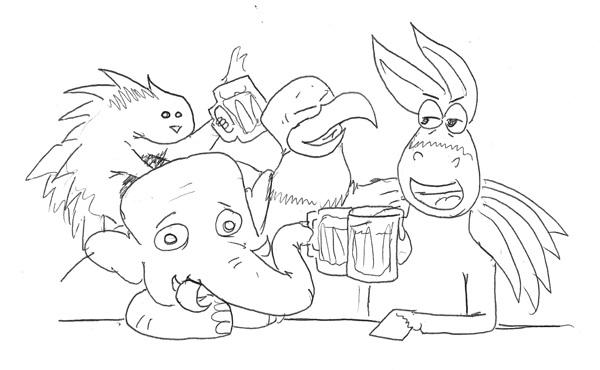
This year’s presidential election revealed that today, our country is evenly split between red and blue. Although President Barack Obama took the electoral college votes by a landslide, the popular vote seemed to be pretty deadlocked, with maybe a difference of a few hundred-thousand to a million votes. Americans’ vision for the future seems to be separated by a fork in the road – one liberal or Democrat and one conservative or Republican.
During this election season, numerous news stories illustrated how divisive that fork can be. The stereotype that liberals and conservatives are so inherently different makes people unwilling to communicate, costing them their personal or even professional relationships. This is most apparent in Congress, where gridlock between Democrats and Republicans makes it impossible to get things done.
Political differences do not have to come between people and disagreements do not have to last forever. Our staff is very politically diverse and includes conservative to moderate Republicans, proud Libertarians, liberal Democrats and leftist Socialists. Yet, our political and ideological differences do not destroy our relationships as colleagues, co-workers and friends.
We are aware that the campus we cater to is composed of students who also hold varying perspectives and do our best to give our community a space to speak. We work side-by-side, day and night to put out a paper we hope we can be proud of, no matter what political party we are affiliated with.
We do not deny that there are ideologically irreconcilable worldviews in our newsroom. Some of us believe that marriage is between a man and woman, while one or more of us identify as LGBT. Some of us believe that prostitution and marijuana should be decriminalized, while others would never want to live in a society where those things are legal. Some support raising taxes to enrich public education and provide universal health care, while others view any raises in taxes as a threat to our country’s well being.
If we were members of Congress, our differing opinions would make passing any kind of sweeping legislation extremely difficult. However, we appreciate these differences in each other and see the need for diversity in our ideas to create a reality that we can all live in peacefully. We have no problem with healthy debate and arguments as long as we maintain respect for eachother.
Journalists are curious above anything else. As well read and opinionated as many of us are, we care about learning about and understanding other opinions most of all. We know that communicating with people with different viewpoints is essential to thinking critically and becoming smarter.
People with differing political views, who cannot agree to disagree, are often unwilling to consider the other side’s perspective. Instead of getting to know each other, they base their judgements of their ideological opposites on stereotypes and assumptions.
Conservatives may think liberals are all about big government, sunshine and peace signs, but many of our democratic or liberal editors support the second amendment, the death penalty and having smaller, more efficient government. Liberals may think conservatives are stingy, unfair and homophobic, but our Republican editors are more than generous, reasonable and accepting of different lifestyles or preferences. Conservatives and liberals may both think Libertarians are confused oddities, but our Libertarian editors are the most well-organized and responsible and keep the production of this paper going.
Instead of squabbling and sitting in self-gratifying ignorance, we encourage ideological polar opposites to sit down and talk. The willingness to have a discussion about what is right, wrong, or just won’t work is the best way to come to a solution. Even if a solution can’t be reached, everyone walks away with a perspective they didn’t have before.
The ground rule for talking about differing opinions is establishing common goals. Once everyone knows what needs to be achieved, it’s easier to logically find a route as opposed to debating in two different directions. Never attack someone personally, otherwise the entire structure of the discussion crumbles.
Critical analysis is necessary in honing, rejecting or fortifying ideas. Without a challenge to your preconceived ideas or ideology, you risk the chance of having a weak or shaky foundation for a worldview.
If we were all cut from the same cloth, we would work in a very monotonous, boring newsroom. Fortunately, our unique staff makes for a very fun environment, where we joke around with each other on how different we are. If we can be colleagues and friends, we do not see why Jill Blue and Joe Red cannot be jovial to each other. If we can get along and put out a paper four days a week, we don’t see why our political leaders cannot.
It’s not as hard as everyone makes it out to be.





